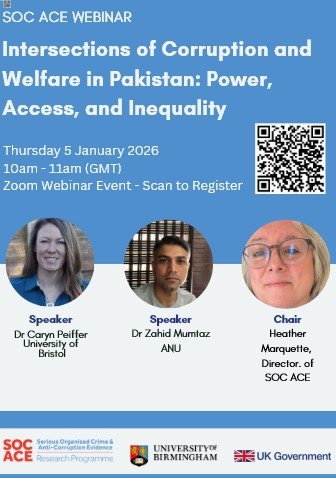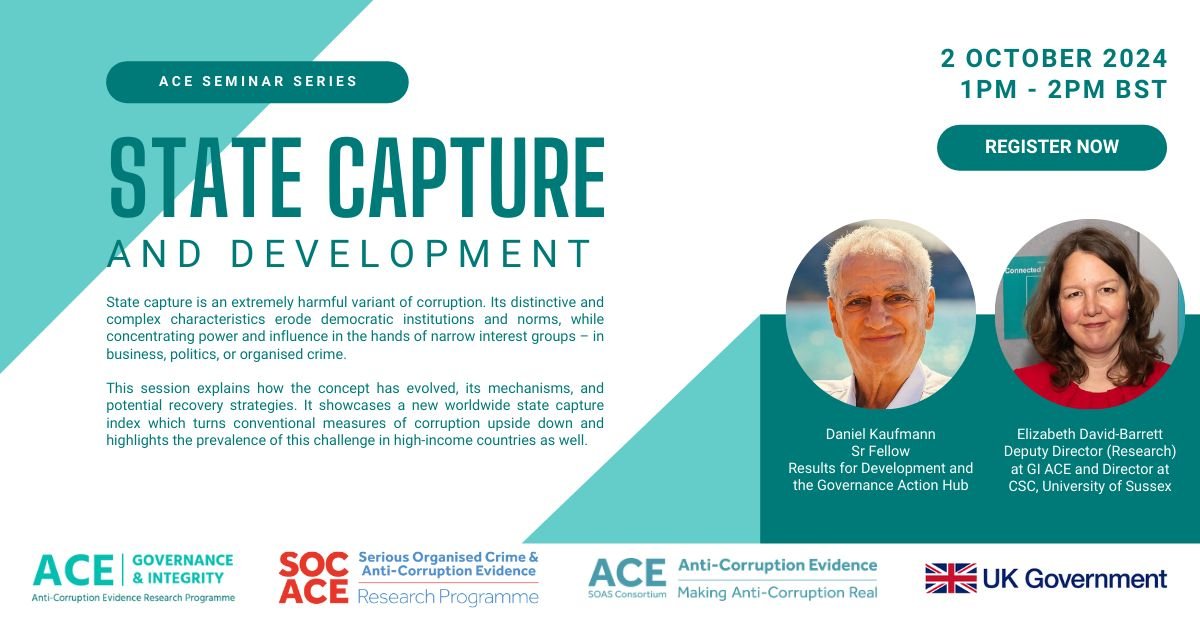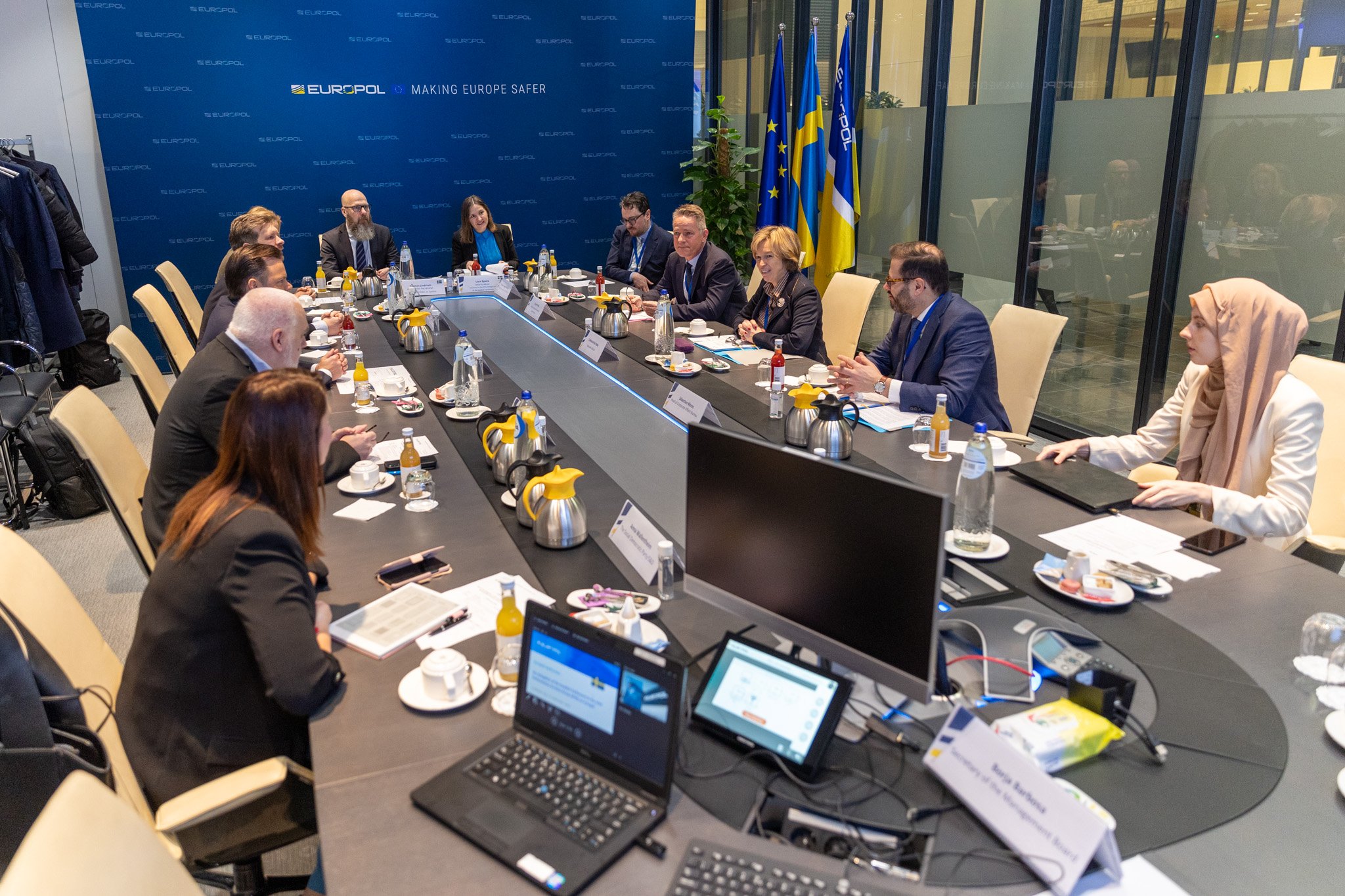EVENTS

Intersections of Corruption and Welfare in Pakistan: Power, Access and Inequality - Dr Zahid Mumtaz and Dr Caryn Peiffer
Webinar - Intersections of Corruption and Welfare in Pakistan: Power, Access and Inequality - Join the authors Dr Zahid Mumtaz and Dr Caryn Peiffer - for a webinar exploring the complex relationship between corruption and informal security welfare regimes, with Pakistan as a case study. In contexts where formal welfare systems are weak or inaccessible, people often depend on kinship ties, community structures, and patron‑client networks for social protection.

Women and Illicit Finance in Russia’s Occupation of Ukraine - Dr Orly Stern and Olivia Allison
Webinar - Join SOC ACE researchers Dr Orly Stern and Olivia Allison for a webinar examining the gendered dynamics of Russia’s occupation of Ukrainian territories. They will consider how women participate in - and are harmed by - the illicit financial flows (IFF) underpinning the occupation economy.

Rooting Out Collusion: Reforming Police and Military Entanglement with Organised Crime
Webinar - Rooting Out Collusion: Reforming Police and Military Entanglement with Organised Crime. Join the authors for a webinar examining why Colombia and Georgia succeeded in reducing police and military involvement in organised crime whilst South Africa's reforms failed to address the problem, and what this reveals for contemporary security sector reform, organised crime control, and resilience building.

Flying Money, Hidden Threat: The Growth of Chinese Money Laundering Organisations
Kathryn Westmore will launch her new research paper Flying Money, Hidden Threat: The Growth of Chinese Money Laundering Organisations at RUSI. She will explore why and how CMLOs have become so successful, and whether the threat they pose should be considered a 'state threat'.
When: Novermber 12 2025, 17:00 to 19:30.
Where: This an in-person event at RUSI HQ, 61 Whitehall, London. SW1A 2ET

SOC ACE Paper Launch Webinar: Looting Mariupol - Russia’s use of illicit finance and economic crime in occupied Ukraine
Join researcher, Olivia Allison (University of Exeter/RUSI) and moderator, Tom Keatinge, Director of the Centre for Finance and Security at RUSI, for the online launch of the new SOC ACE-supported research, ‘Looting Mariupol: Russia’s use of illicit finance and economic crime in occupied Ukraine’ paper, at 13:00pm (BST) on Wednesday 14 May 2025.
Click through for more information or register here!

ACE Seminar Series: 'Strategic Corruption: Unpacking its meaning and global implications'
Join SOC ACE researcher, Dr Tena Prelec (University of Rijeka), and discussants Dr Bertram Lang (Philipps University Marburg) and Dr Claudia Baez Camargo (Basel Institute), to critically explore the concept of strategic corruption, an emerging framework for understanding the instrumental use of transnational corruption in advancing political and economic objectives.
Click through for more information or register here!

Launch Event: Tackling the Growing Threat from Hostile States
Join researcher Matthew Redhead (RUSI) and panellist Professor Rory Cormac at the launch event of the much anticipated research into the concept and characteristics of state threats, at RUSI on 14 January 2025! Sig-up to the in-person event here!

Launch Event: The Role of Financial Rewards for Whistleblowers in the Fight Against Economic Crime
Sign up HERE for the launch of SOC ACE supported research led by Eliza Lockhart, RUSI, on the role of financial rewards for whistleblowers in the fight against economic crime.

BISA: Strengthening links between academia, policy and practice
On the 22nd of October, 2:00-3:30pm the new BISA Working Group on Security Policy & Practice will host an online introductory event. The group aims to cultivate and facilitate a policy-engaged dialogue that brings together academic, practitioner and policymaking communities to discuss all aspects of UK security policy and practice. This event will introduce the new working group to BISA members and reflect on how the group might help to strengthen engagement between these communities. Explore the groups’ BISA page here.

The Anti-Corruption Evidence (ACE) Seminar Series: State Capture and Development
This October, the Foreign, Commonwealth & Development Office (FCDO), SOC ACE, SOAS ACE, and GI ACE launch a new monthly seminar series, bringing together top experts, researchers, and practitioners to explore innovative, evidence-based strategies to tackle global corruption. The series kicks off with a seminar on state capture—how it works, its global prevalence, and strategies to combat it.

SOC ACE Inaugural Research Conference: Addressing Global Challenges in Serious Organised Crime and Anti-Corruption
The SOC ACE Research Conference will bring together top researchers, policymakers, and practitioners to address the global issues that inspired the SOC ACE programme. The event will feature the latest research, engaging panel discussions, and a practical workshop on policy engagement, all aimed at advancing the fight against organised crime and corruption. Attendees will gain valuable insights and tools to drive meaningful change in this area.

GI-TOC: Expert Group Discussion on Assessing Global Responses to Illicit Financial Flows
GI TOC are hosting their Expert Group Meeting on Assessing Global Responses to Illicit Financial Flows this September. The main objective of the meeting is to discuss the current global response to IFFs as well as guiding improvements thereof going forward. The discussion will also feed into a global policy report that will propose a set of recommendations that can inform future work in the area.

CEEISA-ISA 2024 Conference Roundtable: Illicit Finance, Transnational Corruption and Informal Economies in Contemporary Conflict
SOC ACE researchers will be taking part in a roundtable to discuss the Illicit Finance, Transnational Corruption and Informal Economies in Contemporary Conflict at the CEESA-IA Joint Conference.

IACC 2024 Workshop: Combatting Modern Kleptocracy: Assessing the Impact of Two Years of Sanctions on Russia
This panel considers how responses from the democratic world since Russia invaded Ukraine, including sanctions, have accelerated the effectiveness of efforts to combat modern kleptocracy.

GI-ACE ‘From Secrecy to Scrutiny: A New Map of Illicit Global Financial Networks’
Dr Haberly's work sheds new light on which global financial centres are used for illicit financial flows, and how this has evolved since 1990 in the face of a changing regulatory and policy environment.

BISA 2024 Conference Roundtable: Rethinking Stabilisation and Responding to Transnational Threats
SOC ACE researchers will take part in a roundtable on ‘Rethinking Stabilisation and Responding to Transnational Threats’ at the BISA Conference 2024.

World Bank Fragility Forum Panel: Addressing Development Challenges posed by Criminal Violence in Middle-Income Countries
The session focuses on the challenge that violence represents for development in Middle Income Countries (MIC). The new IDB "Framework to Support Populations in Situations of Fragility, Conflict, and Criminal Violence (FCCV)" in Latin America and the Caribbean, which emphasises the need to confront this challenge, is briefly presented.

RUSI’s inaugural Serious and Organised Crime Conference 2023
SOC ACE is proud to be a partner in RUSI’s inaugural Serious and Organised Crime Conference 2023. This flagship conference is organised by RUSI’s Organised Crime & Policing Group along with the National Crime Agency. Other partners include the University of Cambridge and CREST Advisory, while EY is a conference sponsor.

RUSI’s Centre for Financial Crime & Security Studies online roundtable: The Future of the FATF
Centre for Financial Crime & Security Studies online roundtable: The Future of the Financial Action Task Force (FATF).

Virtual Event: Russia’s Economic Occupation of Ukraine: New Insights into Russia’s strategies in the occupied territories
David Lewis will introduce a new report showing how Russia is using economic and financial tools to consolidate its control of occupied Ukrainian territory.
Please note: this event time is Eastern Time (ET) local to Washington DC

GI-TOC OC24 Virtual Event: Monitoring the Evolution of Illicit Economies in Afghanistan
Since the Taliban’s takeover in 2021, the potential future for illicit economies and organised crime within the country and the region more broadly has been in flux. In collaboration with the University of Birmingham, the Global Initiative against Transnational Organized Crime (GI-TOC) has been developing a new infrastructure for monitoring the evolution of illicit markets and the political economy in Afghanistan and the region more broadly.

New dynamics in Illicit Economies and Conflict after the Russian invasion of Ukraine: implications for power, politics and the role of research
This half-day workshop will provide a forum in which to discuss new research findings, map knowledge gaps and discuss new approaches to researching the illicit economies of conflict. It aims to improve our knowledge and understanding of these issues; to provide an opportunity for researchers – including those at early career level – to build links with policymakers and practitioners; and to identify potential opportunities for future collaboration and learning. (Invitation only)
40th Cambridge Symposium, Plenary Workshop 41: Exploring mechanisms for the recovery of the proceeds of kleptocracy
The Cambridge International Symposium on Economic Crime first convened as a result of widespread concern is a unique international platform that makes a real difference to the control of economically relevant crime and misconduct across the world. As part of the symposium this plenary, will discuss alternative asset recovery mechanisms that can help address the immediate policy goal surrounding Russian-linked sanctioned assets and contribute to strengthening the broader asset recovery framework.

Making anti-corruption real: how to stop wasting money and start making progress
If a policy adversely affects powerful individuals and organisations, we shouldn’t be surprised when they try to block or distort its implementation. In developing countries where the rule of law is weak, policies may also be blocked in informal or corrupt ways.
Making anti-corruption real means understanding these processes and ensuring that every anti-corruption strategy has built-in incentives so that actors with the ability to implement these strategies will do so in their own interest.
Please note: event time is local Jakarta (WIB) time
Academic Council on the United Nations System (ACUNS) Annual Conference: Incorporating serious organised crime into understandings of elite bargains/political settlements
This panel delves into the topic of organised crime and took place during the 36th Annual ACUNS Meeting in Washington DC, where the theme was focussed on 'Making, Keeping, and Sustaining Peace.'

‘How to seize a billion’, Ukrainian Canadian Bar Association (UCBA) in partnership with the Ukrainian Canadian Congress
In this timely and relevant seminar, we will discuss alternative asset recovery mechanisms that can help address the immediate policy goal surrounding Russian-linked sanctioned assets and contribute to strengthening the broader asset recovery framework.

From freeze to seize: exploring mechanisms to recover the proceeds of kleptocracy
‘From freeze to seize: exploring mechanisms to recover the proceeds of kleptocracy’, Hybrid: Online/10-11 Carlton Terrace, London, 24 November 2022

